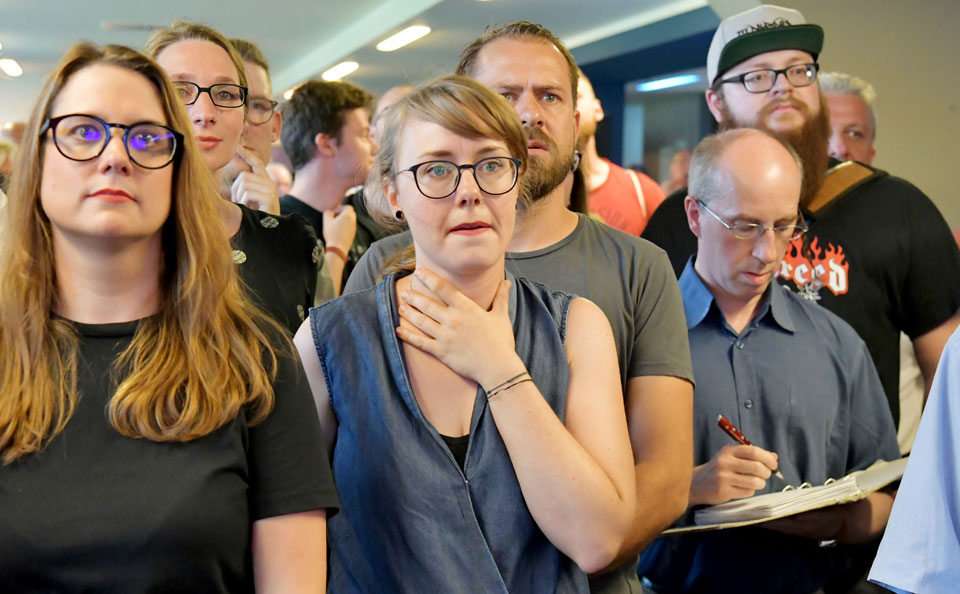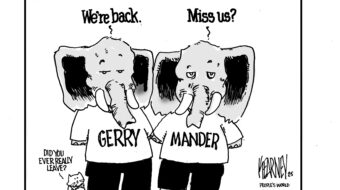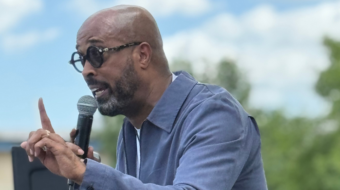
BERLIN—Sharp gains early this month for the neo-fascist Alternative for Germany (AfD) party in the eastern German states of Saxony and Brandenburg, coupled with falling support in both states for the Left Party, Die Linke, have the German left more worried than they have been in a long time. In both states, the extreme right AfD managed to rake in about 25% of the vote, the highest totals ever for that extremist party in any German state elections.
Saxony, whose capital is Dresden, has been ruled by a “Black-Red” so-called “Grand Coalition” of the Christian Democratic and Social Democratic Parties. (Black and red are the official colors of those parties, respectively.) The election results have put an end to the possibility of that coalition continuing.
The Christian Democrats will have to select a third party in order to form a new governing coalition, and those talks are still underway. Since they have sworn never to form a coalition with either the AfD or Die Linke, their only viable choice to bring them a majority is the Green Party. The expectation then is that within days the new ruling coalition in Saxony will be a Black-Red-Green coalition. The bright side for the entire center and left, of course, is that despite its large vote, the AfD will be kept out of the government in Saxony.

Brandenburg, the state that completely surrounds but does not include Berlin, has been ruled by a Red-Red coalition of the Social Democrats (SPD) and Die Linke. The increased vote for the AfD there may well spell the end of Die Linke’s participation entirely in the new government in that state.
The SPD, by joining with Die Linke, has had a solid majority in Brandenburg. It can form a majority now by bringing the Greens into the current Red-Red coalition but that would give it a majority of just one vote. If it brings the Christian Democrats into the government, instead of the Greens, it can rule with just the Christian Democrats, ending any left pressure it now feels governing with Die Linke. Given the Social Democratic history of selling out left-wing principles almost whenever it can, this is a strong possibility.
The next round of German elections on Oct. 27 is in Thuringia, where, as the party with a plurality of the votes, Die Linke leads a coalition of itself, the Social Democrats, and the Greens. Because it was the biggest vote getter in Thuringia four years ago, Die Linke currently holds the presidency in Thuringia, with Bodo Ramelow occupying that position.
Thuringia has a history of being governed by left-wing coalitions going all the way back to the days of the Weimar Republic of the 1920s when a coalition of the Communist Party of Germany and the Social Democrats was in place there. The SPD government in Berlin stepped in and removed the socialist leadership in Thuringia at that time because it opposed coalitions with Communists, causing that coalition to collapse. The resulting disunity in Thuringia and in many other German states contributed to the rise of Hitler’s Nazis.
Read other recent People’s World coverage from Germany:
Despite internal differences, Germany’s Die Linke struggles for unity against the right
U.S. and NATO warmakers find some willing partners in Germany
A first: Red-red-green coalition wins in Bremen, Germany’s poorest state
Berliners win a few battles in their fight for affordable housing
While the left is hoping Ramelow can hold on with his coalition in Thuringia on Oct. 27, many in Die Linke have not always been happy with his positions. He frequently condemns the former socialist German Democratic Republic in what they say is an overly enthusiastic attempt to dilute right-wing critics who connect Die Linke to the GDR.
Ramelow has also hinted he would not mind possible compromise on Die Linke’s firm opposition to German troops being stationed abroad if such compromise were needed to bring Die Linke into a national governing coalition.
Strategy re-think
There is no denying, however, that on a national level, Die Linke is in the midst of seriously re-examining its strategy. History dictates that it cannot do otherwise. In the party’s early years soon after German reunification, it was racking up close to if not more than 40% of the vote in some east German states, states that were part of the old GDR. Those totals are down around 10% in many of those same areas today.
Officially, Bernd Riexinger, the party’s co-president, is downplaying the losses, according to a People’s World source who spoke directly with him about the dismal results. Riexinger is saying, according to the source, that there have been losses in the east but that they are mainly due to the dying out of the “old faithful,” people who supported the old ruling Socialist Unity Party of the GDR. That party, when the Berlin Wall came down, became the Party for Democratic Socialism and later when it combined with other leftists in what had been West Germany, it became Die Linke. Riexinger told our source that the losses in the east were being made up by gains in the west where the party, he says, is attracting more younger members.
In some places, at least, Riexinger has a point. In Bremen in western Germany earlier this year, gains by Die Linke led to the creation of a Red-Red-Green coalition there. Three years ago, gains for Die Linke in what was once West Berlin also resulted in a similar coalition government for the entire capital city.
Katja Kipping, Die Linke’s co-chair, was not as positive in her assessment of the losses. At Die Linke headquarters here last week, she was asked for her assessment. “It’s a catastrophe,” she said, but she cautioned that it is not yet time for a “schlachtschussel.” Translated, it means a shakeup that happens after a slaughter!
The current Die Linke leadership has been in power for eight years, and the party is slated to hold internal elections at its convention next spring. At that time, a schlachtschussel is a distinct possibility, especially if things go bad in Thuringia at the end of this month.
Sahra Wagenknecht, the co-leader of Die Linke’s parliamentary fraction, was saying some months ago that she intended to quit. This was after the failure of Aufstehen, a movement she founded, to get off the ground. It was intended to reach out to working-class voters who want an avenue other than “traditional” political parties to express their disgust with the establishment. Aufstehen did not put the same emphasis on support for immigrants that Die Linke has always expressed. It was Wagenknecht’s hope that this would make it more appealing to some voters. The new movement failed to go anywhere.
Wagenknecht has now pulled back on her announcement to quit, and it appears she is planning to stay on. She leads the parliamentary group along with co-chair Dietmar Bartsch.
Reversing the fall
Advisory groups that help formulate ideas to reverse Die Linke’s drop in the polls have been meeting around the country. On Thursday of last week, one such group met in Berlin.
One of the concerns raised there, according to a leading member who attended the meeting and spoke with People’s World afterward, was that the party has to re-orient itself more to the working class. The party has to be seen, he said, as the first and strongest fighter for wages, working conditions, rights on the job, and other things workers are concerned about.
“People want to see Die Linke on the picket lines and in support of strikes when they happen,” the source said. Among the issues that attendees argued have to be addressed is that the party leadership has to be more willing to talk about socialism as the long-term goal. People at the meeting used the example of Sen. Bernie Sanders in the U.S., who they said has been unafraid to raise the issue of socialism. They said that mentioning socialism has strengthened, not weakened, the Sanders campaign.
Others said the issue of the GDR has to be handled differently. The right wing continually tries to tie Die Linke to the GDR. Instead of running away from the GDR, said people at the meeting, Die Linke should present a more balanced approach, pointing out gains that had been made by that country.

One person said that if Finland is unafraid to say it has adopted its education system from the GDR model, Die Linke should be less afraid too.
On immigration, it was widely felt that compromise is needed and that Die Linke has to do more than just welcome unlimited amounts of immigrants regardless of from where or how they come. The feeling was that there has to be a stepped-up fight for workers’ rights all over the world and that freedom for people to move is not always the same as capital’s aim of a mobile working-class that can be shifted and exploited at will.
Another suggestion was a new stress by Die Linke all over the country on curbing rents and the costs of housing. This has happened in Berlin with a great deal of success.
In Berlin, in fact, Die Linke has called for the takeover of the nation’s biggest real estate mogul, Deutsche Wohnen.










